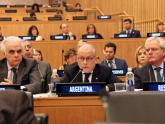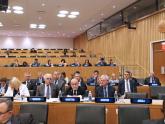Thursday 21 de june de 2018
Information for the Press N°: 266/18
Foreign Minister Jorge Faurie at the United Nations Decolonization Committee
With the participation of Foreign Minister Jorge Faurie and in a session on the Malvinas Question, the United Nations Special Committee on Decolonization approved a consensus resolution, which was submitted by Chile and co-sponsored by Cuba, Nicaragua, Bolivia and Ecuador, calling on Argentina and the United Kingdom to resume bilateral negotiations in order to resolve the sovereignty dispute.
In the presence of delegates and representatives and after a special mention in memory of late former Foreign Minister Dante Caputo, Faurie stated that “Argentina’s sovereignty rights are grounded on a solid historic and legal background. The passing of time has not affected the validity of our claim or changed our firm belief that this sovereignty dispute must be resolved peacefully, through bilateral negotiations between Argentina and the United Kingdom aimed at finding a fair and lasting solution.”
“Such belief is enshrined in Argentina’s most important legal instrument, the Argentine Constitution. Our Constitution establishes our permanent goal of recovering full sovereignty, in accordance with international law, but respecting the way of life of the inhabitants of Malvinas. This goal goes beyond governments and political and partisan differences. It is a true State policy,” he stated.
Faurie stressed that “many countries at multilateral fora, such as MERCOSUR, the OAS, CELAC, G77+China and Ibero-American Summits, have expressed their support for the resumption of negotiations between Argentina and the United Kingdom,” and clearly stated that Argentina “firmly believes in the importance of constructively analyzing and discussing our differences. Therefore, we once again call on the Government of the United Kingdom to achieve this goal, in the belief that it is paramount to avoid unilateral acts in the area subject to the sovereignty dispute.”
The Foreign Minister headed the Argentine delegation, joined by the Provisional President of the Senate, Federico Pinedo, and the Governor of the Province of Tierra del Fuego, Antarctica and South Atlantic Islands, Rosana Bertone. Other members of the delegation included Senators Julio Cobos, Rodolfo Urtubey, Miriam Boyadjian and José Ojeda and congressman Alejandro Grandinetti. Luis Vernet and Ricardo Patterson were present as petitioners for Argentina’s claim and delivered speeches. Also present were officials from the Argentine Mission to the UN, headed by Ambassador Martín García Moritán, and from the Undersecretariat of Malvinas and the South Atlantic.
“Argentina, as established in the Argentine Constitution, is not indifferent to the interests, welfare and prosperity of the inhabitants of the Islands, a commitment made by all our democratic governments,” Faurie noted, but stressed that the principle of self-determination is not applicable to the Malvinas Question, because in order for this principle to apply “there must be a people under foreign domination, and, in the case of the Malvinas Islands, it could hardly be understood that the inhabitants of the Islands were ever under colonial foreign domination.”
Faurie also stressed that “President Macri has ushered in a new phase in the relationship with the United Kingdom, which has led to mutual high-level visits, trade and business missions and various cooperation initiatives,” recalling the recent visit by British Secretary of State for Foreign Affairs Boris Johnson last May -the first visit to Argentina by a British Foreign Minister in 22 years- and the high-level meetings held by the Chief of Cabinet of Ministers, Marcos Peña, a few weeks ago in London.
In addition, Faurie made reference to the meeting of the Scientific Subcommittee of the South Atlantic Fisheries Commission, held 14 years after the last meeting, “motivated by the shared willingness to preserve fishery resources.” He also underscored the work carried out by the Argentine and British governments with a view to establishing an additional flight to Malvinas -out of a MERCOSUR country- so as to “increase links between the Argentine mainland and the Malvinas Islands.”
The Argentine Foreign Minister then underscored the outcomes of the 2017 Agreement, under which it was possible to identify the bodies of the Argentine soldiers buried in Darwin Cemetery as soldiers only known to God, an enterprise to which he referred as “highly valuable and of great humanitarian significance.” This led to last March’s unprecedented and moving trip of the relatives of the fallen soldiers, who were respectfully welcomed by the inhabitants of the Malvinas Islands.
The Minister added that “this broad and constructive agenda pursued by both countries since President Macri took office contributes to building the necessary confidence to overcome past differences.”
Faurie concluded: “We firmly believe that, with political will, a lasting solution to our sovereignty dispute can be reached.”
After speeches had concluded and the resolution had been passed, Faurie praised “the efforts made throughout decades by the Decolonization Committee to eradicate colonialism” and thanked once again all supporting countries for the attention paid to the Malvinas Question as a “special and particular” case. Finally, the resolution was approved by consensus.
Press Release No. 266/18




